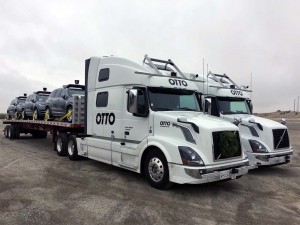
A pair of autonomous Otto trucks carrying prototype autonomous Volvos being tested by Uber. The Teamsters are watching autonomous laws carefully.
The International Brotherhood of Teamsters is zeroing in on federal legislation regarding ‘self-driving’ technology.
The union, which represents thousands of truck drivers and package delivery drivers employed by companies such as UPS, says any legislation must take into account public safety and the safety of working Americans employed in transportation and related industries.
Lawmakers on Capitol Hill have begun discussing 14 pieces of draft legislation on self-driving vehicles that are at center of a technological revolution that would eliminate the need for drivers either behind the wheel or in the front seats of vehicles, ranging from tractor-trailers to small delivery vans.
Tesla, Waymo and Uber and other companies have already spent millions of dollars on researching the new technology, which combines artificial intelligence as well as ultra-sophisticated mapping technology, sonar, radar and computerized cameras to duplicate the jobs now done by human drivers.
(Automakers want free hand to test autonomous vehicles. To see what the GOP proposes, Click Here.)
The Teamsters union, meanwhile, emphasized it plans to maintain a keen interest in the pending legislation. In a statement said it has been closely monitoring “all aspects of the technology, urging lawmakers to prioritize safety and transparency in rules concerning the testing phase of self-driving vehicles.”
The union also said it is calling for comprehensive federal rules regulating autonomous vehicles, including strong minimum safety standards. Under any such legislation, states and cities should retain their authority to regulate the safe operations of vehicles.
“If anyone needs to be at the table for a discussion on self-driving technology, it’s the package car driver, the longhaul truck driver and the taxi driver,” said Jim Hoffa, Teamsters General president.
“We are encouraged that legislators are soliciting feedback on early proposed legislation, and we firmly believe it’s important that their constituents — and that includes Teamsters — are involved in the process and listened to throughout,” Hoffa said.
(Why is Waymo teaming up with Avis and Apple with Hertz? Click Here to find out.)
Hoffa added the union believes that “the interests of all stakeholders, including workers, must be taken into account by legislators and regulatory agencies as they explore and address developments in automation.”
There are currently no concrete federal laws governing automated driving technology or the testing of such technology. A number of states have enacted varying rules or guidance concerning semi-autonomous and autonomous vehicle testing, Hoffa noted.
As the rules are shaped, the Teamsters Union will be continually urging lawmakers and regulatory agencies to take a thoughtful and measured approach to ensuring safety on the roads, and hold operators testing self-driving technology to high standards of transparency and accountability.
“Federal safety laws and the laws governing our roadways have been developed over many years. We see no positive outcome that could come from any rush to implement laws due to urgency from the companies that have a profit interest in the rollout of their technologies,” said Lamont Byrd, director of the Teamsters Safety and Health Department.
(GM rolls out 130 Chevy Bolt battery-electric autonomous vehicles for start of test program. Click Here for the full story.)
“Technological advancements, like automatic braking and lane departure warnings, have helped drivers in many ways, but wholescale and expansive changes that are not properly vetted and overseen by public officials will not serve anyone when it comes to safety,” Byrd added.
